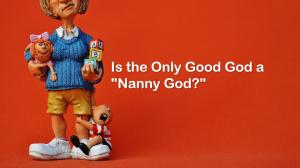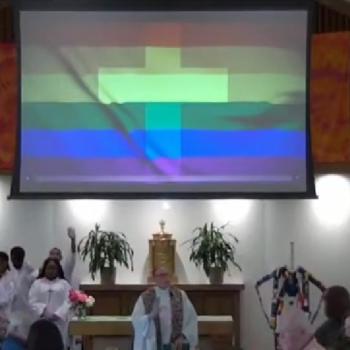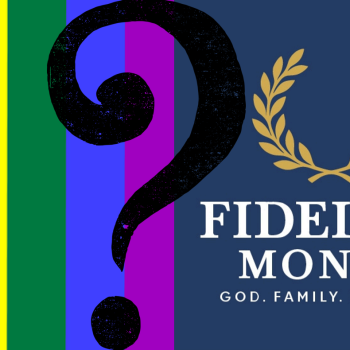One main thing I come away with in my discussions with atheists, and those critical of the Christian God, is this: the only good God is a “nanny god.” What do I mean by a “nanny god?” Please continue reading. I lay out the appeal of a “nanny god” and how atheists, and others, reject the Christian God because He fails to meet the demands of “nanny godlings.”
The “Nanny God”
What is a “nanny god?” Simple. A “nanny god” does everything for a person, even those things they can do themselves. This god makes sure nothing bad ever happens to anyone and ensures no one ever suffers any pain. Most importantly, the “nanny god” makes sure evil does not exist, while also allowing for people to do what they want, with whomever they want, at the same time. In other words, the only “good god” provides a utopia where nothing bad ever happens and people can do whatever they want, if doing that “whatever” does not involve any pain or negative consequence. So, pain is out but pleasure is definitely in. The good “nanny god” provides a nursery where all are welcomed, affirmed, and celebrated, but never challenged, inconvenienced, or disciplined.
The Christian God
Conversely, the Christian God is no nanny. This God demands holiness and does not accommodate sin. This God, in the person of Jesus of Nazareth, sacrificed His life, in a very violent way, for the salvation of humanity. In this sacrifice, Jesus experienced suffering and invites us to participate in it with Him. This God also understands that the avoidance of suffering does not benefit His creation. Suffering produces endurance, character, and hope.
Not only that, but we rejoice in our sufferings, knowing that suffering produces endurance, and endurance produces character, and character produces hope, and hope does not put us to shame, because God’s love has been poured into our hearts through the Holy Spirit who has been given to us. (Romans 5:3-5)
Furthermore, as an elite athlete knows he suffers not in vain during his conditioning, so too does the follower of the Christian God know their suffering has a purpose.
The Role of Theodicy
This topic eventually reaches the realm of theodicy, or the reconciliation of a good God with the horrendous evil in the world. Regis Martin, in an article for National Catholic Register on the topic of theodicy, cites the work Cross the Threshold of Hope by Saint John Paul II when he states:
There can be no answer to that question, argues the Pope, so long as pain and suffering are seen as a problem to be solved, and not as a mystery to be endured. A mystery, moreover, whose entire resolution turns on the pierced and crucified Christ, who did not come to rid the world of its pain, but instead to enter into it so deeply as to become the true owner of it, in order thus to redeem it. Not from above by way of intellectual edict, but from within and below by way of existential engagement.
To restate: Christ did not come to rid the world of its pain, He entered the world to take ownership of it, to redeem it. This ownership Christ accomplished during the events of Holy Week and culminated in His resurrection on Easter Sunday.
Remaking God in Our Own Image
In a recent discussion with Michael Lofton at Reason and Theology, Trent Horn (of Catholic Answers) made an insightful comment regarding progressive Catholics that remain in the Church. I have often wondered about the same things. Horn states:
There’s a deep-down recognition of something stable and better. There’s a just something better especially about the Catholic Church than anything else. And there’s a desire to remake that in their own image.
I do think among all of them, I do see a thread. When people say, “why are you still Catholic?” They’ll say, “I was raised in this… this is part of my identity… this is who I am… I am emotionally attached…” They just want reshape it so its more comfortable for them.
So, in this case, those who even claim the name “Catholic” seek a variation of the “nanny god.” The Catholic version of the “nanny god” loves indiscriminately, celebrates the impenitent, and provides a utopian nursery where Catholics remain blissfully immature. The Catholic “nanny god” tolerates much but remains stubbornly intolerant to any talk of “sins,” especially of the flesh.
Final Thoughts…
To conclude, I completely understand the appeal of a “nanny god.” Without Christ to give meaning to suffering, a “nanny god” that takes care of everything provides great appeal. This god also provides the focus of much scorn and hatred for not existing. Atheists and those critical of the Chrisian God mistakenly apply their scorn to the Christian God. Furthermore, I stand with atheists in denouncing this false god. I appeal to all who despise the “nanny god” to consider the one true Christian God. You will never be the same.
Thank you!
Read The Latin Right’s other writing here.
Please visit my Facebook page and IM your questions (and follow my page) or topics for articles you would like covered.
Also, please subscribe my YouTube page for updates on upcoming articles.














